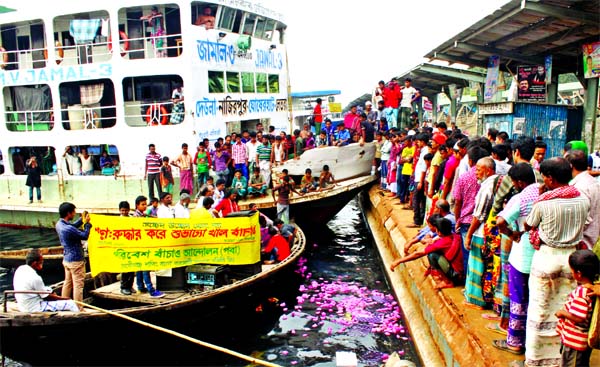
Sagar Biswas :Sufferings of the residents, especially those live in middle and eastern part of capital city Dhaka, have mounted recently for contaminated household water reportedly supplied by Dhaka Water Supply & Sewerage Authority [DWASA].The sufferers said that they have been getting blackish and stinky water for the last several days, which is not drinkable at all. The bad smell remains in the water even if it is boiled in 100 degrees Celsius. The face and the eyes burn if the water is used for wash. The body starts to itch if it is used for bath. Several people have already been affected by diarrhoea, dysentery and other water-borne diseases, they complained.The unhygienic water has posed a serious health hazard to thousands of dwellers who live on both sides of the Green Road, Karwan Bazar, Moghbazar, Jatrabari, Jurain, Wari, Banogram, Sutrapur, Gandaria, Dholai Khal, Manik Nagar, Shahjahanpur, Sabujbagh, Mugda, Bashabo, Kamlapur, Purana Paltan and some other city areas.Pointing the consequence of using the contaminated water, Assistant Professor of Dhaka Medical College and Hospital Dr Sudip Ranjan Dev said, “If anyone takes Chlorine mixed water, it can cause vomiting, diarrhoea and other diseases.” “We are suffering from pure drinking water for several days. The water supplied by DWASA is stinky and dirty. Our family members are being affected with skin diseases for using the water,” Md Safayet Ullah, who lives in the city’s Moghbazar area, said.Echoing the same, another resident of Begunbari area, Montaj Ali, claimed that his wife became seriously ill due to taking contaminated water supplied by DWASA. The DWASA admitted the situation, and said that this problem had been created due to use of chemical [Chlorine] in Shitalakkaya water for reducing its contamination. But the DWASA could not tell when such problem would be solved. Rather, they advised the citizens to collect pure drinking water from nearest DWASA pump. When contacted, Managing Director of DWASA Taksim A Khan on Saturday said, “We are trying to get a permanent solution to the problem. We are trying to introduce an environment-friendly, sustainable and pro-people water management.””We think, the dirty elements may enter due to leakage in the main pipeline. Besides, the water may become contaminated due to use of old water pipelines. Apart from it, several people do not clean their underground reservoir and rooftop tank which may also create health hazard….. However, boiled water is safe for health,” the MD said.But refuting the DWASA MD’s claim, a resident of Madartek Abul Kalam Azad said, “The water is not useable at all. We have been buying water jar and bottled water for drinking for the last couple of months, which has increased our living cost. Besides, we collect water from neighbouring places for other household purposes.”Meanwhile, the water experts said that the DWASA collected 22 per cent water from the rivers and the rest 72 per cent comes from deep tube-wells. They have categorically blamed the system of water collection from the rivers terming it ‘fully inaccurate’.Water expert Professor Ainun Nishat said, “It is not possible to maintain purity of water in which way the DWASA collects water from the Buriganga and the Shitalakkhya. Besides, the DWASA uses excessive chemicals [Chlorine] to clean water. For that reason, the water becomes stinky and it makes burn when used for face-wash or bath.”In fact, the situation is more critical in the city’s slum areas where pure drinking water is almost rare. According to a latest study, out of the capital’s 45 lakh slum dwellers, 41 lakh have no formal access to water supplied by DWASA. The slum dwellers have to pay through their nose to get rationed water supplies from slum leaders having political influence. The slum leaders are making brisk business with water stolen from DWASA’s supply lines, the study said.

